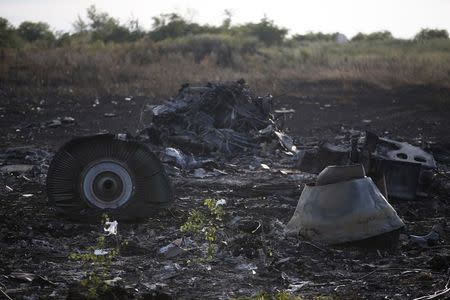Monitors gain better access to crash site in eastern Ukraine

By Anton Zverev HRABROVE Ukraine (Reuters) - International monitors said on Saturday they had been allowed to see more of the site where a Malaysian airliner crashed in rebel-held eastern Ukraine, though gunmen still stopped them approaching some of the wreckage. In sometimes tense scenes with pro-Russian rebels clearly uncomfortable at having observers and the press present, a top official at the Organization for Security and Cooperation in Europe said access had improved since they arrived on Friday. Securing the site and preserving evidence is crucial for investigators to try to piece together what, and who, caused the airliner to plunge into the steppe on Thursday, but some officials suggest the scene has already been compromised. "We have now had the possibility to see a bit more of this rather large scene. We have observed the situation here as it was presented to us," said Alexander Hug, deputy chief monitor of the OSCE special monitoring mission to Ukraine. "We also had the possibility to speak to those who are in charge here, and ... to speak to inhabitants of a local village." He told reporters: "As in any job, the cooperation improves over time ... we had better access today." On Friday, a group of monitors were hampered in their work by "armed personnel who acted in a very impolite and unprofessional manner. Some of them even looked slightly intoxicated", an OSCE spokesman said. On Saturday, gunmen formed a line along the edge of the fields where the plane crashed, killing all 298 people on board, ostensibly to show they were securing the site. The pro-Russian rebels, who want independence for Ukraine's eastern Donbass region where most people speak Russia, say they have not touched the site, but at least some of their number at the scene said some bodies had been taken away in trucks. World leaders have called for a rapid investigation into Thursday's airliner disaster, which could mark a pivotal moment in deteriorating relations between Russia and the West. The United States and other powers said a surface-to-air missile appeared to have been fired from rebel-held territory. But some officials fear time may be running out to ensure a thorough and forensic investigation. "I don't think it's too late. But with each passing day you lose a chance to protect and secure the scene and the bodies," said Michael Bociurkiw, an OSCE spokesman, adding he thought the security presence at the site had been laid on for their visit. "It's a huge area. You need a lot of people to protect the bodies and give them the dignity they deserve." He told a later news conference that the monitors had, for the first time, seen rescue workers removing bodies from the site and putting them in bags. "Typically these bags were placed on both sides of the closed roadway. Some of the bags were open and exposed to the elements. We don't quite know why. We counted today 55 body bags and 50 marked locations of bodies," he said. "ANGRY, FURIOUS" After meeting Ukrainian President Petro Poroshenko who said he condemned interference with work at the crash site, Dutch Foreign Minister Frans Timmermans said the Netherlands was "angry, furious" by news that bodies were being moved around and the site was not being "treated properly". He said the Netherlands, which lost 193 citizens on the flight from Amsterdam, would not rest until those responsible, and those that supported them, were brought to justice. Ukraine says Russia played a decisive role in shooting down the plane, and called on Moscow to hand over what it said was the Russian crew of the SA-11 radar-guided missile system. Russia and pro-Russian rebels deny any role in the disaster. Locals wandered over a part of the crash site on the outskirts of the village of Rozsypne, leaving flowers and toys on the wreckage. A Reuters witness saw that some of the debris had been moved since Friday. The rebels accused Ukraine of preventing international investigators from arriving and called for help from Moscow to recover bodies starting to rot after two days in summer heat. "There's a grandmother. A body landed right in her bed. She says 'please take this body away'. But we cannot tamper with the site," rebel leader Aleksander Borodai said. "Bodies of innocent people are lying out in the heat. We reserve the right, if the delay continues ... to begin the process of taking away the bodies. We ask the Russian Federation to help us with this problem and send their experts." (Additional reporting by Peter Graff in Donetsk and Thomas Escritt in Amsterdam; Writing by Elizabeth Piper; Editing by Andrew Heavens and Andrew Heavens)

